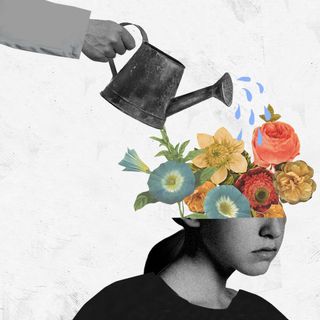
Do Multivitamins Really Make People Healthier?
Multivitamins may help people with nutrition deficiencies, but there is little evidence they benefit people with balanced diets.

The world of wellness is home to many mysteries, but chief among them is how beneficial multivitamins really are. The supplements offer a halo of health in an otherwise chaotic world. During the pandemic, multivitamins’ sales jumped as people scoured for any and every immunity booster. Other estimates show that one in three people regularly take them. One may have wondered at least once if they should take a supplement, how safe it is, or if multivitamins work.
It begs the question: does science align with this wellness hype? Are multivitamins the ticket to better health as much as everyone wants them to be?
Well, it’s all very subjective. For one, science is a little fuzzy around the exact health benefits of multivitamins — mainly because there is no standard definition of what and how much nutrients a multivitamin must contain. So while some may define a multivitamin as a magic pill with three different vitamins and minerals, others may classify it as a supplement with essential nutrients close to recommended daily requirements. “This makes it difficult to generalize on their benefits as they also tend to be formulated differently for children, adults, men, women, pregnant women, and older adults,” as Science Alert noted.
Then, the definition of “better health” may never have one unequivocal answer. Here’s what we know the multivitamins can do: fill in nutritional gaps when the diet doesn’t. For instance, someone eating a restricted diet (vitamin B12 helps with a deficiency in vegan diets) suffers from a condition where nutrition is not absorbed correctly (celiac disease) or is pregnant. Scientific evidence supports the need for folic acid and other nutrients such as iodine, iron, and vitamin D before and during pregnancy. Even the benefits of iron supplements for women and children are well-established. “Individual vitamin supplementation may also be essential in certain cases, such as a deficiency caused by long-term poor nutrition or malabsorption caused by the body’s digestive system not functioning properly,” Harvard’s The Nutrition Source blog noted.
Where evidence falls short is in determining if they help people who otherwise have a relatively healthy diet. Dr. Gideon Meyerowitz-Katz, an epidemiologist from the University of Wollongong in Australia, wrote, “there does not appear to be strong evidence that multivitamins improve health for people who are otherwise healthy and have a balanced diet.”
Related on The Swaddle:
Indian Vitamin Sales Shot Up Nearly 100% in 2020 as Interest in Boosting Immunity Peaked
Even a 2018 study showed multivitamins had little tangible benefits. “We were surprised to find so few positive effects of the most common supplements that people consume,” Dr. David Jenkins, lead author of the study, said. “Our review found that if you want to use multivitamins, vitamin D, calcium or vitamin C, it does no harm — but there is no apparent advantage either.” In other words, if multivitamins are not treating a specific deficiency, they might be doing nothing at all.
For instance, the benefits of multivitamins are tied to reduced risk of heart disease and cancer. In 2012, a study of heart attack survivors, either on placebo or high doses of multivitamins, came to a predictable conclusion: both showed similar rates of later heart attacks, heart surgeries, and death. Other studies concur with this, showing little impact on cardiovascular-related events or mental decline.
In some cases, the supplement intake is linked to harmful effects too. Beta-carotene supplements, for instance, taken alone or with other vitamins, were found to increase the risk of lung cancer in smokers.
Are there limits to this insurance supplement? Unequivocally yes. Yet, people know at least one person who’s big on popping supplements. The idea that multivitamins improve health could also be the result of a paradox. Most people who take multivitamins are more likely to have a higher education level, higher incomes, lower body mass index, and higher physical activity levels – all factors that science links to better health. Plus, people who take multivitamins tend to have higher micronutrient intakes from their diet than nonusers,” ScienceDaily explained. This can fuel the idea that the multivitamin does aid a healthy body and mind.
Related on The Swaddle:
Untrending: Antioxidants Can’t Cure Cancer, Preserve Youth
It then becomes a problem of optics, triggering a food versus supplements war. As WebMD put it: “…if taking 100% of the Recommended Dietary Allowance (RDA) of, say, vitamin C is good enough to keep us going through the day, then why shouldn’t taking 1,000% to be enough to melt our fat, cure our blues, and let us leap tall buildings in a single bound?”
The battleground is by no means equal; experts have reiterated time and again that there is no replacement for a good diet. Even the vitamins and minerals in a supplement flood the bloodstream quickly, making it difficult for the body to absorb them. As a result, our bodies flush these nutrients out in urine, according to researchers. On the other hand, the body absorbs nutrition from foods more thoroughly as digestion is slower.
For Deborah O’Connor, a nutrition professor at the University of Toronto, the modern multivitamin is a “leftover” from a different time when our deficiencies were much different. She explained the redundancy of their benefits today when the average diet does live up to its potential. Plus, an insistence on taking multivitamins may even overlook the current dietary gaps.
“There is no arguing that multivitamins are important when nutritional requirements are not met through diet alone,” The Nutrition Source wrote. “The debate is whether vitamins are needed when the diet is adequate to prevent deficiency in nutrients, as some research has shown no benefit or even harmful effects when taking supplemental vitamins and minerals.”
There’s no one truth about multivitamins, as much as people would like. They help when there’s a deficiency; if not, the benefits (or the lack of it) are still deeply contested. Research is still evolving and is hardly set in stone, but it is probably best to cautiously approach this world of pill-popping supplements. When in doubt, think of the “too much of a good thing” wisdom.
Saumya Kalia is an Associate Editor at The Swaddle. Her journalism and writing explore issues of social justice, digital sub-cultures, media ecosystem, literature, and memory as they cut across socio-cultural periods. You can reach her at @Saumya_Kalia.
Related


Is Your Therapist Responsible for Making You a ‘Better’ Person?
